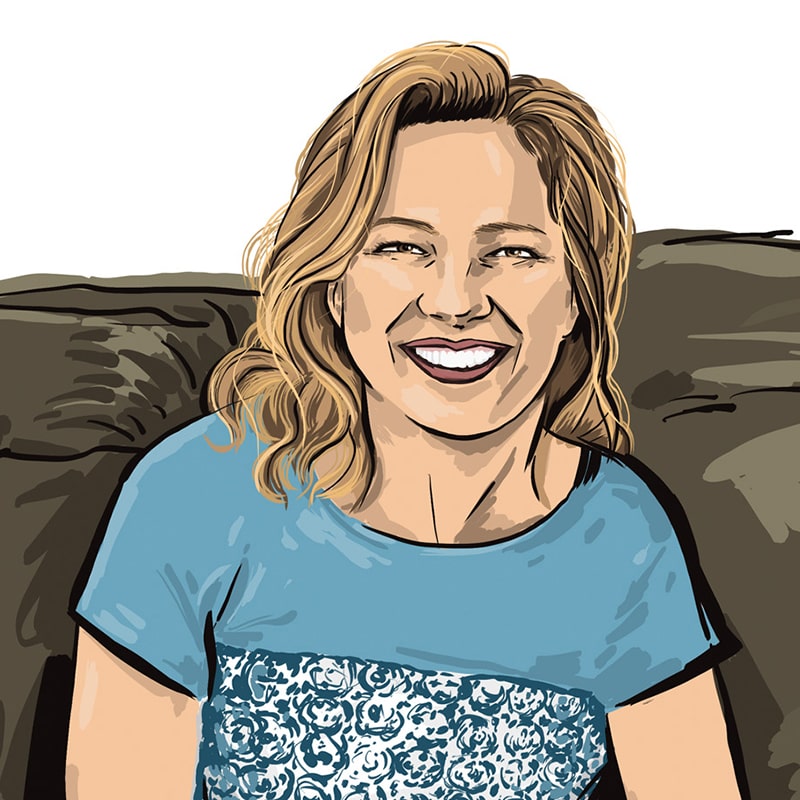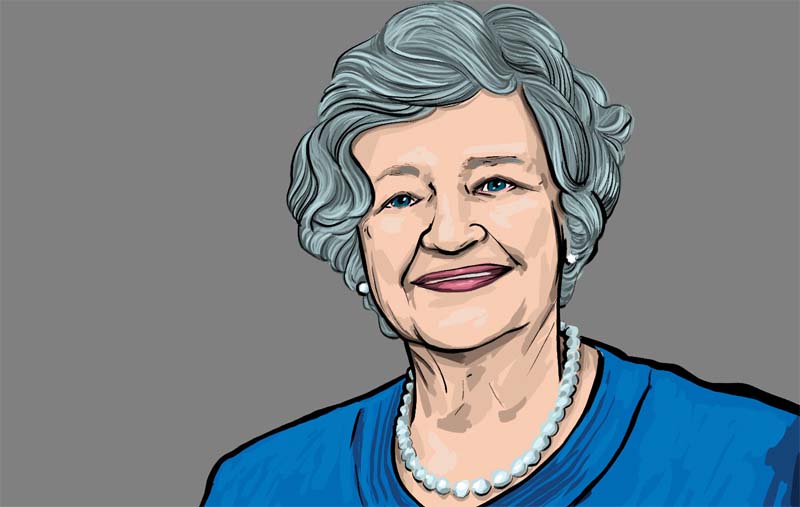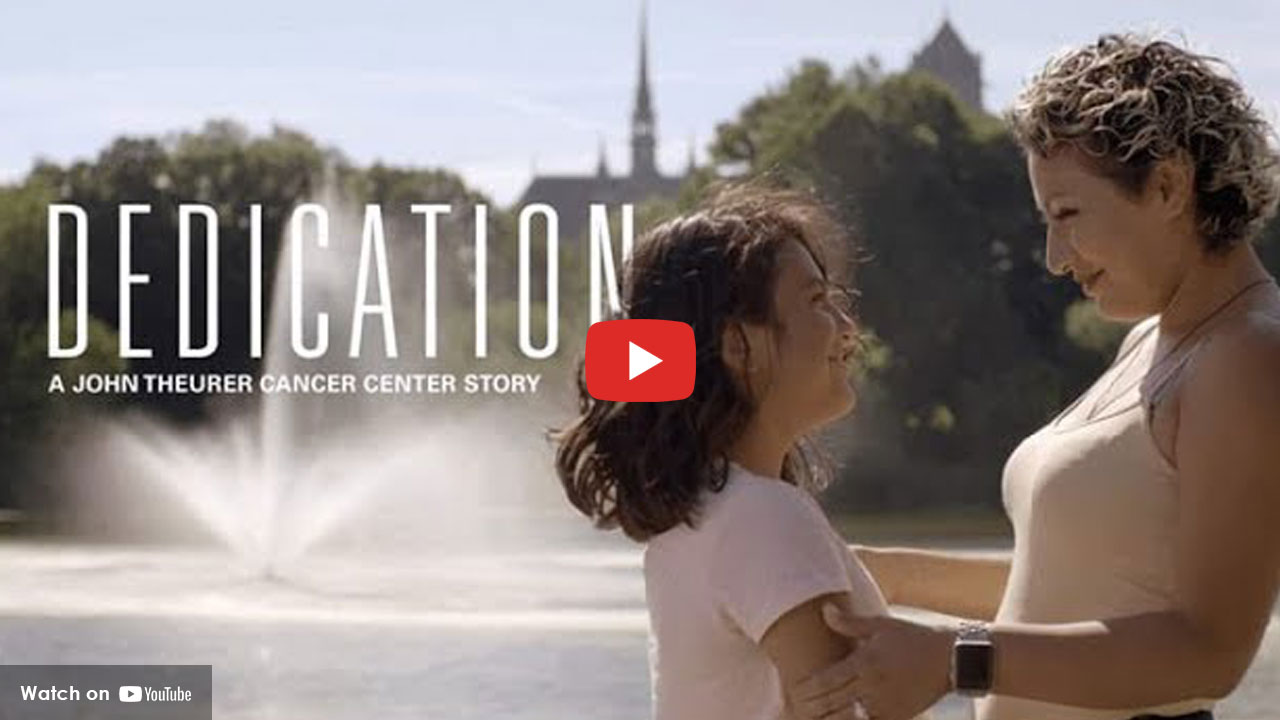
Silvana M.'s fight against breast cancer began on her wedding day. Through aggressive treatments, her doctors have given her every chance for more tomorrows.
August 29, 2016, is a date Silvana M. will never forget. It’s the day she married her husband—then, after a quick brunch, went to John Theurer Cancer Center at Hackensack University Medical Center to start her first round of chemotherapy, with her husband and family by her side.
Cancer treatment isn’t included in most wedding plans, or plans in general. “You always hear stories about cancer, but you never expect to go through it,” says Silvana, who was 29 when diagnosed with stage II triple-negative breast cancer, an uncommon and aggressive form of the disease.
The diagnosis came at a time when Silvana was looking forward to a future with her fiancé and 8-year-old daughter. “I was afraid of passing away and losing [my daughter], never being a part of her life,” Silvana says.
A Team Effort
Silvana first felt a hard lump on her left breast in the summer of 2016. She eventually received an ultrasound at the Betty Torricelli Institute for Breast Care, part of Hackensack. Doctors found a 3.6-centimeter mass, and a biopsy confirmed the cancer diagnosis.
A barrage of tests and appointments followed, including meetings with Deena Mary Atieh Graham, M.D., a medical oncologist specializing in breast and gynecologic cancers, and breast surgeon Tara M. Balija, M.D. Silvana’s care went beyond the necessary treatment plan, with a collaborative team addressing fertility and body image issues, and resources to support her whole self.
“We have social workers and nutritionists help them throughout their treatment course,” says Dr. Graham. “We have yoga for our patients to help build mindfulness and spirituality.”
Within a month of her diagnosis, Silvana started chemotherapy, necessary with her type of tumor where targeted treatments like hormone therapy are not effective. “We unfortunately have to use the big guns [chemo] for these patients since we don’t have targeted medications that treat these aggressive triple-negative breast cancers,” says Dr. Balija.
The physical and emotional toll of almost six months of chemo wasn’t easy, but Silvana’s family and her faith helped her get through it. “You have to keep your spirits up high,” she says. “It’s hard because you become like a little old lady. I couldn’t walk. I’d get tired. I would have chemo brain, forgetting everything.”
Because of her age, desire to save her breasts and the size of her tumor, her medical team did surgery after chemotherapy to minimize the amount of tissue that would need to be removed. It worked: In February 2017, Dr. Balija performed a successful lumpectomy with minimal scarring. Radiation followed, bringing Silvana’s treatment to an end in May 2017. She has been in remission for two years.
“Dr. Balija and Dr. Graham gave me hope that there will be a tomorrow,” Silvana says.
Not only will there be a tomorrow, but Silvana is pregnant with her second child, despite experiencing pre-menopause during chemotherapy. “We didn’t expect to be blessed like this,” she says. “The thought that I can become a mom again brings a lot of joy.”
What to Know About Breast Cancer Screening
Dr. Graham offers these tips for breast cancer screening:
- Know Your Risk Level. Breast cancer risk factors include a strong family history, a genetic predisposition, prior personal history of breast cancer and previous abnormal mammograms.
- Get Screened. Women with an average risk should start annual screening mammograms at age 40. For women at higher risk, screening guidelines vary; talk to your doctor for personal advice.
- Manage Your Fears. Whether you’re afraid of the actual mammogram or of being diagnosed with breast cancer, speak to your provider. Don’t let fear cause you to skip this lifesaving screening.
Supermom Surgeon
Surgical residency is a challenge at the best of times, but add single motherhood to it and it’s a challenge most people would shy away from. Not so for Dr. Balija, who became a mom at 19 while in college and had two more children before starting medical school.
Dr. Balija originally went into medicine to become a pediatrician, which she felt suited her personality and desire to connect with people. When her interest shifted to surgery, she worried she wouldn’t be able to have the close doctor/patient relationship she desired. But after some initial experiences in breast surgical oncology, she discovered it could give her the best of both worlds. “I realized that I could be a surgeon yet still have these long-term relationships with patients and really help them with the fight of their lives,” she says.
Next Steps & Resources
- Meet your sources: Deena Mary Atieh Graham, M.D. and Tara M. Balija, M.D.
- To make an appointment with Deena Mary Atieh Graham, M.D., Tara M. Balija, M.D. or another provider, call 800-822-8905 or visit our website
The material provided through HealthU is intended to be used as general information only and should not replace the advice of your physician. Always consult your physician for individual care.
Find a doctor near me
Weight-loss Surgery Leads to Unexpected Discovery for Seaside Heights Mother

Hazlet Breast Cancer Patient Chooses Groundbreaking Reconstructive Technique
Woman’s Best Friend


